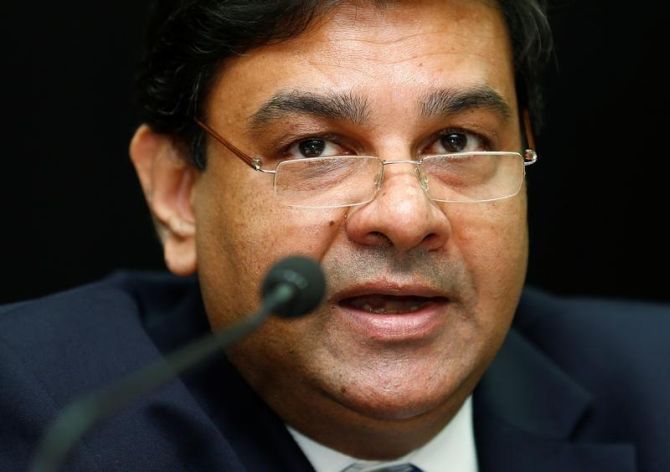 | « Back to article | Print this article |
For July-September, it pegged CPI-based retail inflation at 4.2 per cent which it saw firming up to 4.8 per cent in the second half of the current fiscal.

Reserve Bank of India for the second time in two-month raised interest rate by 0.25 per cent on inflationary concerns.
The central bank in its third bi-monthly policy of the current fiscal raised benchmark repo, or the short term rate at which it lends to other banks, by 0.25 per cent to 6.5 per cent.
The 6-member Monetary Policy Committee (MPC) headed by RBI Governor Urjit Patel kept its stance at neutral.
For July-September, it pegged CPI-based retail inflation at 4.2 per cent which it saw firming up to 4.8 per cent in the second half of the current fiscal.
Retail inflation has been projected to rise further to 5 per cent in the first quarter of next financial year 2019-20.
"The inflation outlook is likely to be shaped by several factors. First, the central government has decided to fix the minimum support prices (MSPs) of at least 150 per cent of the cost of production for all kharif crops for the sowing season of 2018-19.
"This increase in MSPs for kharif crops, which is much larger than the average increase seen in the past few years, will have a direct impact on food inflation and second round effects on headline inflation," RBI said in its third bi-monthly policy review.
"Based on an assessment..., inflation is projected at 4.6 per cent in Q2, 4.8 per cent in second half (H2) of 2018-19 and 5 per cent in Q1:2019-20, with risks evenly balanced," RBI said.
Excluding the HRA impact, the CPI-based inflation is projected at 4.4 per cent in Q2, 4.7-4.8 per cent in H2 and 5 per cent, it added.
On MSP hike, RBI said there is a considerable uncertainty and the exact impact would depend on the nature and scale of the government's procurement operations.
"As such, only the incremental increase in MSPs over the average increase in the past will impact inflation projections.
"Second, the overall performance of the monsoon so far augurs well for food inflation in the medium-term. Third, crude oil prices have moderated slightly, but remain at elevated levels. Fourth, the central government has reduced Goods and Services Tax (GST) rates on several goods and services," RBI said.
This will have some direct moderating impact on inflation, provided there is a pass-through of reduced GST rates to retail consumers, it added.
Additionally, RBI said the inflation in items excluding food and fuel has been broad-based and has risen significantly in recent months, reflecting greater pass-through of rising input costs and improving demand conditions.
Citing all these reasons and that the financial markets continue to be volatile, RBI said the assessment on inflation is based on all these factors combined.
A statement issued after three-day meeting of the Monetary Policy Committee (MPC) noted that the progress of the monsoon so far and a sharper than the usual increase in MSPs of kharif crops are expected to boost rural demand by raising farmers' income.
"Robust corporate earnings, especially of fast moving consumer goods (FMCG) companies, also reflect buoyant rural demand," the central bank said, adding that investment activity remains firm even as there has been some tightening of financing conditions in the recent period.
Based on an overall assessment, the Reserve Bank of India said that the Gross Domestic Product (GDP) growth projection for 2018-19 is retained, as in the June statement, at 7.4 per cent.
As per the RBI, the growth would be in the range of 7.5-7.6 per cent in first half of the fiscal and 7.3-7.4 per cent in October-March 2018-19 period "with risks evenly balanced".
The central has also projected the GDP growth for first quarter of the next financial year at 2019-20 at 7.5 per cent.
The monetary policy statement further said that increased FDI flows in recent months and continued buoyant domestic capital market conditions bode well for investment activity.
The central bank said that activity in the manufacturing sector is expected to remain robust in Q2, though there may be some moderation in pace.
Rising trade tensions may, however, have an adverse impact on India's exports.
Photograph: Danish Siddiqui/Reuters